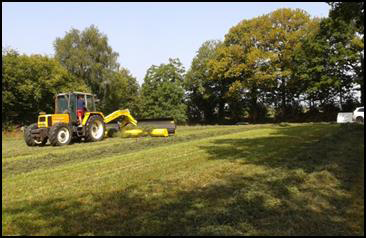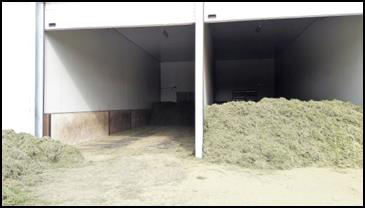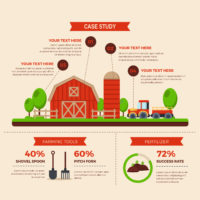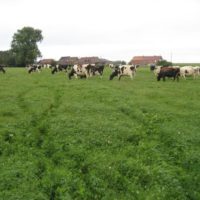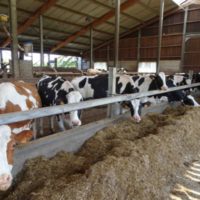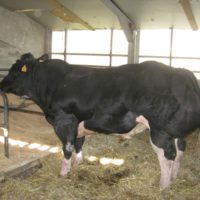A collective hay dryer in barn
Description
The heat from a digester is used to dry green forage. The barn hay drying system is collective. Ten dairy farms are involved.
The aim of farmers is to improve protein self-sufficiency by producing high quality forage and to reduce feeding cost.
190 t dry matter have been dried, come from 84 ha of alfalfa, red clover and multi-species grasslands.
In this farm, 6 ha of multi-species grasslands have been harvested and dried in the collective unit. These grasslands have produced 9,3 t dry matter per ha.
In this farm, temporary grasslands are sown under a cereal cover crop to ensure grassland establishment.
Reason for the innovation
- Focusing on higher production
- Decreasing feeding cost
- A collective organization of harvests
- Curiosity in subject
Farm description
Environment
This plain farm is located in western France, in the department of Mayenne.
- Soils: Clayed-loam
- Climate: Temperate oceanic climate, especially good for forage yield
Grassland management
- Grazing management type: Strip stocking
- Length of grazing period: 8 months
- Forage conservation type: Silage and barn dried hay
Structure
- Annual Work Unit: 4
- Agricultural area: 116 ha UAA
- 34 ha temporary grasslands
- 13.5 ha permanent grasslands
- 50.5 ha corn silage
- Herd: 115 Holstein cows—178 LU
- Stocking rate: 1.5 LU/ha main forage area
- ≈ 20 fattening bulls sold each year
Animal performance
- Milk production per head : 8 300 L /year
Why it is working
A good work organisation and available labour: all farmers aim at a good quality of forage and it needs a harvesting schedule to mow at good maturity stages in each farm.
Proximity between barn hay system and farms: All 10 farms are located around 15 km around the collective unit.
Good relationship between managers of the digester unit and farmers.
This forage conservation type requires a storage building for loose dried-hay.
Additional information
| Farming system | conventional farming |
|---|---|
| Domains of innovation | animal feeding management, forage conservation technique, legume management – Perennial legumes |
| Main types of animal | dairy cattle |
| Country | France |
| Product type | Farmer portrait |
| Language | English, French |
